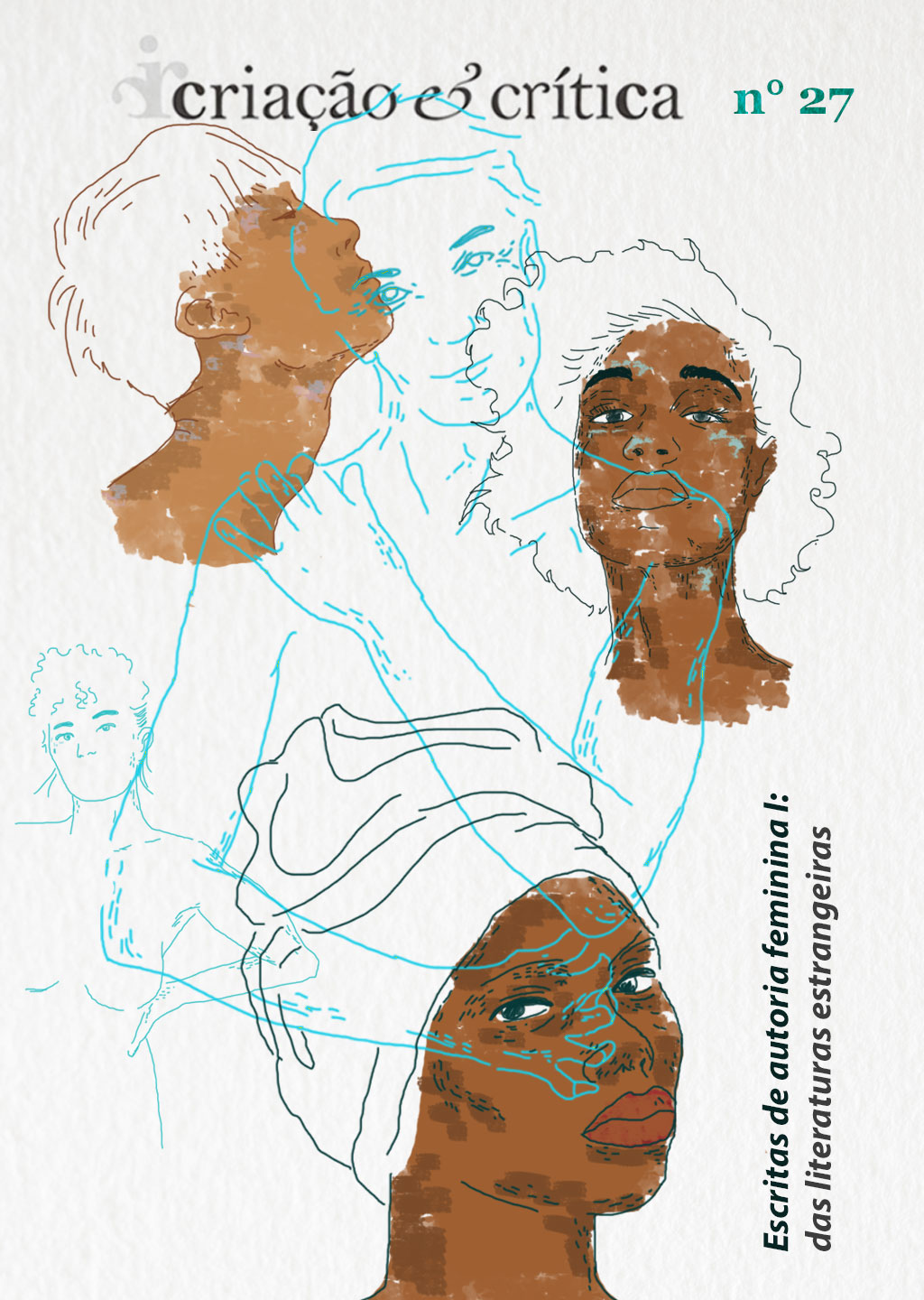Orlando: the attire and the figurations of sexual roles
DOI:
https://doi.org/10.11606/issn.1984-1124.i27p228-246Keywords:
Orlando, Virginia Woolf, Feminist studies, Body, AttireAbstract
The purpose of this article is to interpret the novel Orlando: a biography, published by Virginia Woolf in 1928. The novel is about the homonymous protagonist´s life since his/her 16 years, in the XVI century to his/her 36 years of age, in the XX century. By facing three centuries of history, Orlando has his/her sex changed from man to woman due to enchantment, thus altering his/her social-historical existence. The analysis is based on Kate Millett´s (1970), Germaine Greer´s (1971) and Susan Bordo´s (1997) theories, among others, in order to understand how Orlando´s body alteration and his/her attire change the ways the protagonist is represented and handled in the novel. The imposition of the female socialization due to the character´s materiality becomes clear. The novel highlights the need of suppressing the traditional systematization of gender.
Downloads
References
ASSIS, Fabiana Gomes de. Orlandos: intercâmbio entre Virginia Woolf e Sally Potter. Ilha do Desterro, Florianópolis, v. 70, n. 1, p. 187-198, abr., 2017. Disponível em: . Acesso em: 20 abr. 2020. <https://doi.org/10.5007/2175-8026.2017v70 n1p187>.
ANASTÁCIO, Silvia Maria Guerra. A criação de Orlando e sua adaptação fílmica: feminismo e poder em Virginia Woolf e Sally Potter. Salvador: EDUFBA, 2006.
BELL, Quentin. Virginia Woolf: uma biografia. v. I – Virginia Stephen (1882-1912); v. II – A Sra. Woolf (1912-1941). Tradução de Lya Luft. Rio de Janeiro: Guanabara, 1988.
BORDO, Susan. O corpo e a representação da feminidade: uma apropriação feminista de Foucault. In: JAGGAR, Alisson M. e BORDO, Susan R. Gênero, corpo, conhecimento. Tradução de Brítta Lemos de Freitas. Rio de Janeiro: Rosa dos Tempos, 1997. p. 20-41.
BURNS, Christy L. Re-dressing feminist identities: tensions between essential and constructed selves in Virginia Woolf’s Orlando. In: Twentieth century literature. v. 40, n. 3 (Autumn, 1994). p. 342-364. Disponível em: <http://www.jstor.org/stable/441560>. Acesso em: 20 abr. 2020.
BUTLER, Judith. Problemas de gênero: feminismo e subversão da identidade. Tradução de Renato Aguiar. Rio de Janeiro: Civilização Brasileira, 2013.
COLLING, Ana Maria e TEDESCHI, Losandro Antonio (Orgs.). Dicionário crítico de gênero. Dourados, MS: Ed. UFGD, 2015.
DE GAY, Jane. Virginia Woolf's feminist historiography in Orlando. Critical Survey, v. 19, n. 1, p. 62-72, 2007. Disponível em: <http://www.jstor.org/stable/41556201>. Acesso em: 24 abr. 2020.
FIGUEIREDO, Joana Bosak de. A roupa e o gênero: uma leitura de Orlando e Quim/Quima de Virginia Woolf e Maria Aurélia Capmany. Iara: Revista de Moda, Cultura e Arte. São Paulo: São Paulo, v. 2, n. 2, out./dez., 2009. p. 202-214. Disponível em: . Acesso em: 23 abr. 2020.
FOUCAULT, M. A história da sexualidade, v. 1: A vontade de saber. Rio de Janeiro: Graal, 1993.
GILBERT, Sandra. Introdução. In: WOOLF, Virginia. Orlando: uma biografia. Tradução de Jorio Dauster. São Paulo: Companhia das Letras. 2014. p. 7-43.
GREER, Germaine. A mulher eunuco. Tradução de Eglê Malheiros. Rio de Janeiro: Artenova, 1971.
LOURO, Guacira Lopes. Pedagogias da sexualidade. In: LOURO, Guacira L. (Org.). O corpo educado. Belo Horizonte, MG: Autêntica, 2000.
MACEDO, Ana Cabriela, AMARAL, Ana Luísa (Orgs.). Dicionário da crítica feminista. Porto, Portugal: Afrontamento, 2005. MILLER, C. Ruth. Virginia Woolf: the frames of art and life. London: Macmillan, 1988.
MILLETT, Kate. Política sexual. Tradução de Alice Sampaio, Gisela da Conceição e Manuela Torres. Lisboa: Dom Quixote, 1970.
POOLE, Roger. The unknown Virginia Woolf. Great Britain: Cambridge Univeristy Press, 1995.
RUBIN, Gayle. The fraffic in women: notes on the ‘Political Economy’ of sex. In: REITER, Rayna R. (Ed.). Toward an anthropology of women. New York: Monthly Review Press, 1975, p. 157-210. Disponível em: <https://philpapers.org/rec/RUBTTI>. Acesso em: 20 abr. 2020.
SCOTT, Joan. Gênero, uma categoria útil de análise histórica. Educação & Realidade, n. 20 v. 2 p. 71-99, jul./dez., 1995. Tradução de Guacira Lopes Louro, versão em francês. Revisão de Tomaz Tadeu da Silva, de acordo com o original em inglês. Disponível em: <https://www.seer.ufrgs.br/educacaoerealidade/article/viewFile/71721/40667>. Acesso em: 20 abr. 2020 [a paginação referenciada neste artigo segue a do site consultado: p. 71-99].
WOOLF, Virginia. Diário íntimo II (1924-1931). Traducción de Laura Freixas. Edición de Anne Olivier Bell. Madrid: Mondadori, 1993.
WOOLF, Virginia. The letters of Virginia Woolf. Volume III: 1923-1928. In: NICHOLSON, Nigel and TRAUTMANN, Joanne (Editors). New York: Harvest/HBJ, 1980.
WOOLF, Virginia. Orlando: uma biografia. Tradução de Jorio Dauster. São Paulo: Companhia das Letras, 2014a.
WOOLF, Virginia. Um teto todo seu. Tradução de Bia Nunes de Sousa e Glauco Mattoso. São Paulo: Tordesilhas, 2014b.
WOLF, Naomi. O mito da beleza: como as imagens de beleza são usadas contra as mulheres. Tradução de Waldéa Barcellos. Rio de Janeiro: Rocco, 1992.
Downloads
Published
Issue
Section
License
Copyright (c) 2020 Lisiane Andriolli Danieli, Eliane Terezinha do Amaral Campello

This work is licensed under a Creative Commons Attribution-NonCommercial-ShareAlike 4.0 International License.
Authors who publish with this journal agree to the following terms:
- Authors retain copyright and grant the journal right of first publication with the work simultaneously licensed under a Creative Commons Attribution License that allows others to share the work with an acknowledgment of the work's authorship and initial publication in this journal.
- Authors can enter into separate, additional contractual arrangements for the non-exclusive distribution of the journal's published version of the work (e.g., post it to an institutional repository or publish it in a book), with an acknowledgment of its initial publication in this journal.
- Authors are permitted and encouraged to post their work online (e.g., in institutional repositories or on their website) before and during the submission process, as it can lead to productive exchanges, as well as earlier and greater citation of published work (See The Effect of Open Access).



